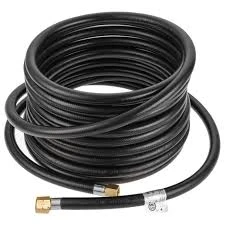335345435
Nov . 29, 2024 12:27 Back to list
Top Fuel Hose Suppliers for Reliable Automotive Fuel Systems Solutions
The Fuel Hose Manufacturing Industry An Overview
Fuel hoses are critical components in automotive and industrial applications, facilitating the safe and efficient transportation of fuel. As the world continues to pivot towards more sustainable and efficient energy solutions, the demand for high-quality fuel hoses has surged. This article delves into the fuel hose manufacturing industry, its key players, production processes, and the challenges it faces.
Understanding Fuel Hoses
Fuel hoses are specially designed tubes used for transferring fuel from one point to another, whether it be from a fuel tank to an engine or in industrial machinery. These hoses must withstand extreme conditions, including high pressures, varying temperatures, and exposure to corrosive substances. Common materials used to manufacture fuel hoses include rubber, thermoplastic elastomers, and metal-reinforced options, each chosen based on their durability, flexibility, and resistance to fuel types.
Key Players in the Industry
The fuel hose manufacturing industry is characterized by a mix of global and regional players. Major manufacturers such as Gates Corporation, Continental AG, and Parker Hannifin dominate the market with a wide range of products designed for different applications. These companies invest heavily in research and development to create innovative solutions that meet the evolving needs of the automotive and industrial sectors.
Additionally, smaller, specialized manufacturers cater to niche markets, providing tailored solutions for specific applications. This diversity fosters healthy competition and drives innovation within the industry.
Manufacturing Processes
The production of fuel hoses involves several stages, each crucial to ensuring the final product meets safety and performance standards. The typical manufacturing process includes
1. Material Selection The choice of materials is vital, as they must withstand the chemical properties of various fuels, including gasoline, diesel, and biofuels.
2. Extrusion The selected materials are extruded to form the base tube of the hose. This process involves melting the plastic or rubber and forcing it through a die to create a continuous length of hose.
fuel hose manufacturers

3. Reinforcement To enhance strength and durability, many fuel hoses are reinforced with textiles or metal strands. This is especially important for hoses used in high-pressure environments.
4. Cutting and Assembly The extruded hoses are then cut to the desired lengths. Fittings and connectors are attached to ensure compatibility with fuel systems.
5. Testing Rigorous testing is conducted to assess the hoses' performance under pressure, temperature variations, and resistance to different fuel types.
6. Quality Control Final inspections are carried out to ensure each hose meets industry standards and regulations, guaranteeing safety and reliability.
Challenges Facing the Industry
Despite its importance, the fuel hose manufacturing industry faces several challenges. One significant issue is the shift towards alternative fuels and electric vehicles, which may reduce the demand for traditional fuel hoses. Manufacturers are responding by diversifying their product lines to include hoses compatible with alternative fuels such as hydrogen and biofuels.
Additionally, rising raw material costs and supply chain disruptions can affect production efficiency and pricing. Manufacturers must continuously seek cost-effective solutions while maintaining quality.
Environmental regulations are also becoming increasingly stringent, compelling companies to innovate in the development of eco-friendly materials and processes. This transition requires investment and a commitment to sustainability, but it also offers opportunities for differentiation in the marketplace.
Conclusion
The fuel hose manufacturing industry plays a crucial role in the functioning of modern vehicles and industrial equipment. With a variety of manufacturers, advanced production techniques, and ongoing challenges, the industry must adapt to rapidly changing market demands and technological advancements. By prioritizing innovation and sustainability, fuel hose manufacturers can continue to thrive in a competitive landscape, ensuring safe and efficient fuel transportation for years to come.
-
SAE 100 R17 Black Smooth Cover Hydraulic Hose
NewsMar.07,2025
-
SAE 100 R17 Black Smooth Cover Hydraulic Hose
NewsMar.07,2025
-
SAE 100 R17 Black Smooth Cover Hydraulic Hose
NewsMar.07,2025
-
SAE 100 R17 Black Smooth Cover Hydraulic Hose
NewsMar.07,2025
-
SAE 100 R17 Black Smooth Cover Hydraulic Hose
NewsMar.07,2025
-
steel wire braided hydraulic hose
NewsMar.07,2025



